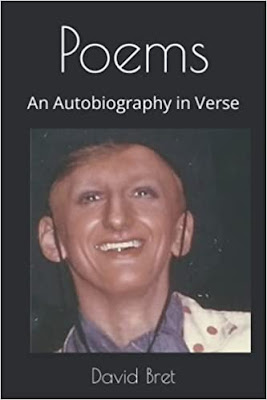Saturday, 19 November 2022
NOVELS: Paris Under The Jackboot
Saturday, 12 November 2022
David Bret: Autobiographies
Foreword
I’ve been around. One benefit of my life is that I never settled down. To date there have been nineteen homes and aside from Grange Farm, where I lived twice, once I left a place I never returned. Thus those I left behind have not changed because I was never there to watch them grow old or leave this world. This made writing these memoirs that much easier, though I have had to think long and hard who or what I should include here, and who or what I should not. In the end I decided to write everything and be damned, and to change a few names here and there to save a few blushes—primarily my own.
I’ve had highs and lows, success, and thankfully and most gratefully in my professional life not that much failure. I’ve loved and lost, experienced joy and pain in equal measure, had friends and lovers who were ordinary men and women, and a few who were famous—if not bordering on the infamous. I’ve lived life to the full to make up for the miseries of my youth, but even then I grasped life with both hands to get me through the horrors of living with an abusive father.
Were it not for the adoration and my need to protect my mother from this man, I would have been dead years ago. I guess that makes me a survivor. When I love, I do so unconditionally, but I bear grudges and when I hate—which is not often, and only under extreme duress—it is with every fibre in my being, which I guess makes me a formidable enemy. Have I told the truth, from A to Z? Yes, I have! And would I do it all again, the good and the bad? You bet! Well, most of it!
David Bret
August 2016
David Bret is an Anglo-French biographer, novelist, historian and broadcaster, with over fifty published titles to his credit. This collection represents poems penned by him over a 50-year period. But minutely edited, they tell of his frequently complicated and controversial private life—his loves, platonic and otherwise, and his life-long involvement with the entertainments industry. The French chanson, pop and rock, opera, royalty, British and European comedy icons, Hollywood movie idols, matinee idols, porn stars and even a serial killer. David Bret has known and associated with them all!
Daddy Not So Dearest: My Parent From Hell
"Evil, cruel, contrived, nasty, homophobic, slimy, pathetic, puerile, poisonous, loathsome, psychotic, despotic, anti-Semitic, bigoted, adulterous and loud-mouthed. These are just some of the terms-and I'm sure there are more-that applied to George Spurr, my adoptive father. Add to this roster child-beater, rapist and crook, and this just about sums him up. It used to make me angry and confused, as a child, watching fathers hugging their sons, or seeing sons weeping for the fathers they had loved and lost. Mine never once hugged me, or showed the slightest affection towards anyone when he was a part of my life, or even suggested that he cared about anyone but himself. When at family weddings I watched fathers proudly lead their daughters down the aisle to give them away at their wedding, my heartfelt desire was to see mine laid out in a wooden box."
This is how celebrity biographer David Bret describes the man who adopted and raised him, in this harrowing story of his abused childhood and youth.
Friday, 11 November 2022
Rudolph Valentino
Rudolph Valentino: A Dream of Desire
Mario Lanza
Mario Lanza: Sublime Serenade


















































